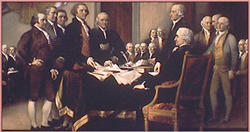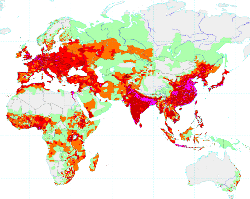 New functional kinds of democracy is one of my primary interests. How can groups of people work out how to organize themselves and act collectively, in a way that serves all the present needs, rather than just serving the lead of an elite, elected or not. Tom Atlee is somebody who has gathered more resources in that field than anybody else I know. This document, which is a couple of years old, is a call for a movement to arise, a movement towards a new kind of democracy. It is based on a series of assumptions, which I for one share wholeheartedly: New functional kinds of democracy is one of my primary interests. How can groups of people work out how to organize themselves and act collectively, in a way that serves all the present needs, rather than just serving the lead of an elite, elected or not. Tom Atlee is somebody who has gathered more resources in that field than anybody else I know. This document, which is a couple of years old, is a call for a movement to arise, a movement towards a new kind of democracy. It is based on a series of assumptions, which I for one share wholeheartedly:1) Differences are a resource for the generation of wisdom, solutions and possibilities.
2) Tapping the richness of diversity requires good attention to process.
3) People who care about something are a special resource for handling it.
4) Properly facilitated dialogue among diverse stakeholders can produce understandings and programs on which they can all agree.
5) A small group (1-5 dozen people) who have been selected (randomly or scientifically; not politically) to represent the diversity of a larger population can, through appropriately facilitated deliberation, generate real wisdom about complex issues on behalf of that larger population.
6) Those who will be affected by a decision should be able to play an informed and appropriate role in shaping that decision.
7) The systems we live in (cultures, institutions, media, power relations, infrastructures, etc.) are among the most profound influences on our consciousness and behavior. Efforts to change a society's consciousness and behavior require changes in systems.
8) The political and governmental systems we have now are not working. In fact, they play a significant role in generating our growing collective problems (even catastrophes).
9) Any positive evolution of democracy will be grounded in collaboration, our common humanity, respect for diversity, and/or our understanding of holism and living systems theory.
10) Such evolution of democracy is of the highest importance. Without it, our circumstances will likely grow increasingly dire. With it, every other public issue will be more readily resolved. This is where the leverage is. And Tom continues by suggesting it will take some movement building action by people who share those assumptions, in the form of gatherings, websites, journals, books, study circles, networking and financing.
[ Organization | 2003-03-08 21:33 | | PermaLink ] More >
|
 New functional kinds of democracy is one of my primary interests. How can groups of people work out how to organize themselves and act collectively, in a way that serves all the present needs, rather than just serving the lead of an elite, elected or not. Tom Atlee is somebody who has gathered more resources in that field than anybody else I know. This document, which is a couple of years old, is a call for a movement to arise, a movement towards a new kind of democracy. It is based on a series of assumptions, which I for one share wholeheartedly:
New functional kinds of democracy is one of my primary interests. How can groups of people work out how to organize themselves and act collectively, in a way that serves all the present needs, rather than just serving the lead of an elite, elected or not. Tom Atlee is somebody who has gathered more resources in that field than anybody else I know. This document, which is a couple of years old, is a call for a movement to arise, a movement towards a new kind of democracy. It is based on a series of assumptions, which I for one share wholeheartedly: Joi Ito has an emergent democracy brainstorm with John Vasconcellos and friends.
Joi Ito has an emergent democracy brainstorm with John Vasconcellos and friends. Here is a map of the population density on Earth. I like maps like that. I notice there's tons of space with nobody there. Because we've already turned those places into deserts mostly. And some places with a huge concentration of people. Mikel Maron says:
Here is a map of the population density on Earth. I like maps like that. I notice there's tons of space with nobody there. Because we've already turned those places into deserts mostly. And some places with a huge concentration of people. Mikel Maron says: